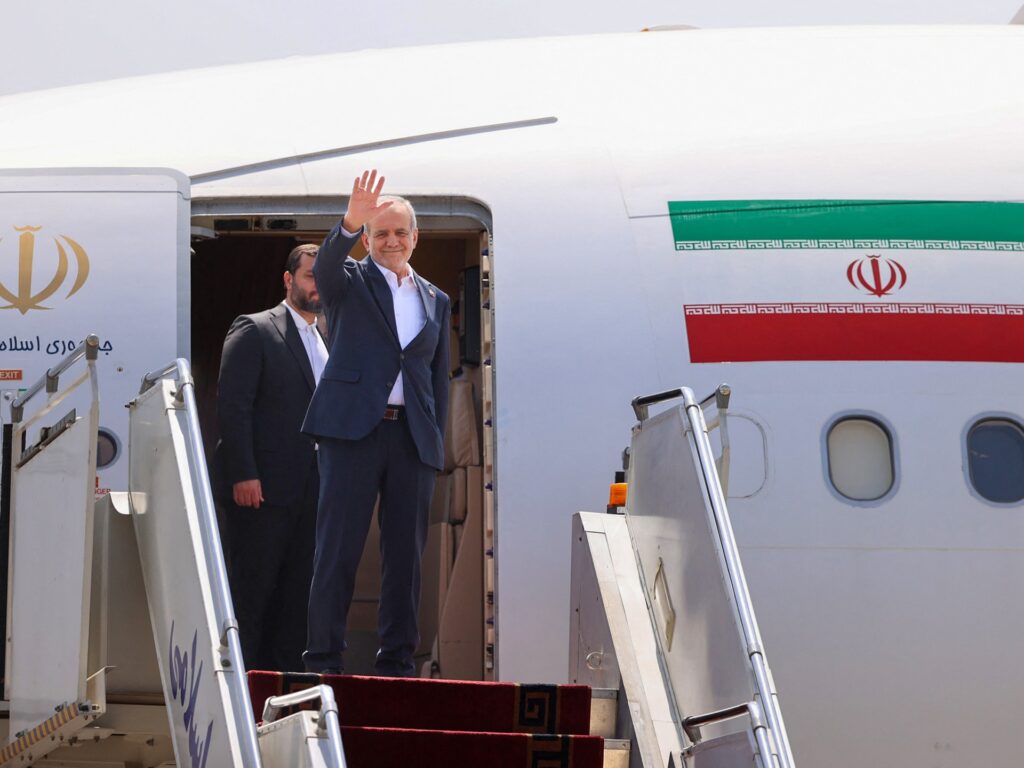Iran rejects ‘Trump Route for International Peace and Prosperity’ (TRIPP), says the presence of American companies in the region would be ‘worrying’.
Iranian President Masoud Pezeshkian is visiting Armenia for talks on a planned corridor linking Azerbaijan near the border with his country, days after Iran said it would block the project included in a United States-brokered peace accord that puts a potential Washington presence on Iran’s doorstep.
The land corridor, dubbed the “Trump Route for International Peace and Prosperity” (TRIPP), is part of a deal signed earlier this month in Washington between former foes Armenia and Azerbaijan.
US President Donald Trump said the deal granted the US exclusive developmental rights to the transport corridor. Washington was also signing bilateral agreements with both countries to increase cooperation in areas like energy, trade and technology, including artificial intelligence.
Before departing for the Armenian capital Yerevan on Monday, Pezeshkian described the possible presence of American companies in the region as “worrying.”
“We will discuss it [with Armenian officials] and express our concerns,” he told state television.
The proposed route would connect Azerbaijan to its Nakhchivan exclave, passing near the Iranian border. Tehran has long opposed the planned transit route, also known as the Zangezur corridor, fearing it would cut the country off from Armenia and the rest of the Caucasus while bringing potentially hostile foreign forces close to its borders.
Since the deal was signed on August 8, Iranian officials have stepped up warnings to Armenia, saying the project could be part of a US ploy “to pursue hegemonic goals in the Caucasus region”.
On Sunday, Iranian Foreign Minister Abbas Araghchi described it as a “sensitive” issue, saying Tehran’s main concern is that it could “lead to geopolitical changes in the region”.
“They [Armenian officials] have assured us that no American forces … or American security companies will be present in Armenia under the pretext of this route,” he told the official IRNA news agency.
The proposed corridor has been hailed as beneficial by other countries in the region including Russia, with which Iran has a strategic alliance alongside Armenia.
Ali Akbar Velayati, a top adviser to Iran’s supreme leader, said Tehran would block the initiative “with or without Russia”.
Trump “thinks the Caucasus is a piece of real estate he can lease for 99 years”, Velayati told state-affiliated Tasnim News soon after the deal was signed, adding that the area would become “a graveyard for Trump’s mercenaries”.
Moscow cautiously welcomed the deal, saying that it supported efforts to promote stability and prosperity in the region. Similarly to Iran, however, it warned against outside intervention, arguing that lasting solutions should be developed by countries in the region.
Armenia and Azerbaijan have fought a series of wars since the late 1980s when Nagorno-Karabakh, a region in Azerbaijan that had a mostly ethnic Armenian population at the time, broke away from Azerbaijan with support from Armenia. Azerbaijan Baku took control of the territory in a military operation in 2023, leading to an exodus of the ethnic Armenian population.
Armenia last year agreed to return several villages to Azerbaijan in what Baku described as a “long-awaited historic event”.
